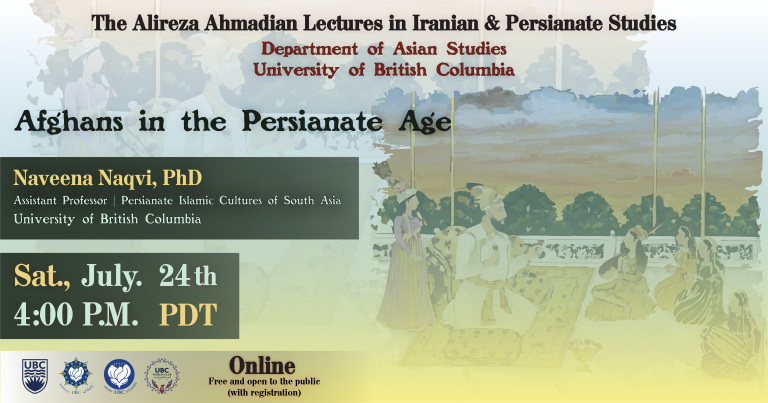

Poster design by Razman Goudarzi
افغانها در عصر نفوذ گستردهٔ زبان فارسی
سخنران: دکتر نَوینا نقْوی، استادیار فرهنگهای اسلامی فارسیزبان جنوب آسیا، دانشگاه بریتیش کلمبیا
در گفتمان عمومی اغلب از مردم افغان منحصراً بهعنوان ساکنان افغانستان، معروف به «گورستان امپراتوریها» و محل جنگهای بومی، یاد میشود. اما افغانها قبل از بهوجودآمدن دولت مدرن افغانستان چه کسانی بودند؟ در این نشست تلاش میشود که با بررسی تاریخ مردم افغان در آسیای مرکزی و جنوبی قبل از دوران معاصر به این پرسش پاسخ داده شود. برای این منظور بر تاجران افغان، صوفیان و کارگران خدماتی در هندوستان که برخی اسنادی را به زبانهای فارسی، پشتو و اردو به جای گذاشتهاند تمرکز میشود.
Too often, Afghan peoples feature in public discourse exclusively as inhabitants of Afghanistan, a so-called ‘graveyard of empires’ and a site of endemic warfare. But who were the Afghans before the modern state of Afghanistan came into being? We will visit this question by observing how the history of Afghan peoples unfolded across Persianate Central and South Asia in pre-modern times. In particular, we will focus on Afghans traders, Sufis and service people in Hindustan, some of whom left behind a written record in Persian, the lingua franca, as well as Pashto and later, in the local vernacular, Urdu.
Naveena Naqvi is a historian of early modern and modern South Asia. Her research interests include the Persianate world (ca. 13th-19th centuries), with a focus on non-courtly Persographic writers in regional contexts during early colonial rule. Her broader fields of interest span the history of political Islam, gender and sexuality, and Hindustani music. She was a postdoctoral fellow at Yale University in 2018-19 and completed her PhD in History at UCLA in 2018. She is currently an Assistant Professor in Persianate Islamic Cultures of South Asia. You can listen to her speak about her work here.
Should you have any questions, please contact the Department of Asian Studies at Asian.Studies@ubc.ca.